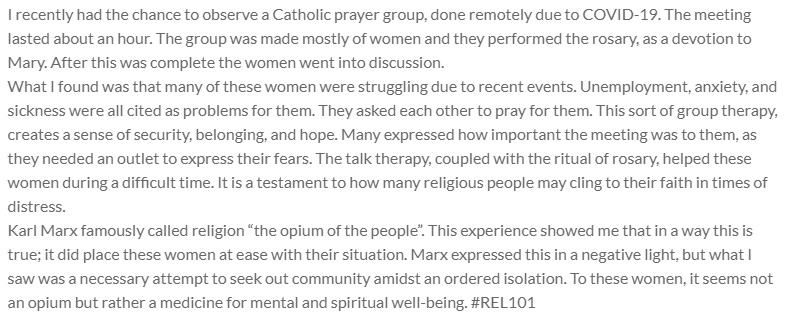Item
Observations on Catholic Prayer Groups
Title (Dublin Core)
Observations on Catholic Prayer Groups
Disclaimer (Dublin Core)
DISCLAIMER: This item may have been submitted in response to a school assignment prompt. See Linked Data.
Description (Dublin Core)
I recently had the chance to observe a Catholic prayer group, done remotely due to COVID-19. The meeting lasted about an hour. The group was made mostly of women and they performed the rosary, as a devotion to Mary. After this was complete the women went into discussion.
What I found was that many of these women were struggling due to recent events. Unemployment, anxiety, and sickness were all cited as problems for them. They asked each other to pray for them. This sort of group therapy, creates a sense of security, belonging, and hope. Many expressed how important the meeting was to them, as they needed an outlet to express their fears. The talk therapy, coupled with the ritual of rosary, helped these women during a difficult time. It is a testament to how many religious people may cling to their faith in times of distress.
Karl Marx famously called religion “the opium of the people”. This experience showed me that in a way this is true; it did place these women at ease with their situation. Marx expressed this in a negative light, but what I saw was a necessary attempt to seek out community amidst an ordered isolation. To these women, it seems not an opium but rather a medicine for mental and spiritual well-being. #REL101
What I found was that many of these women were struggling due to recent events. Unemployment, anxiety, and sickness were all cited as problems for them. They asked each other to pray for them. This sort of group therapy, creates a sense of security, belonging, and hope. Many expressed how important the meeting was to them, as they needed an outlet to express their fears. The talk therapy, coupled with the ritual of rosary, helped these women during a difficult time. It is a testament to how many religious people may cling to their faith in times of distress.
Karl Marx famously called religion “the opium of the people”. This experience showed me that in a way this is true; it did place these women at ease with their situation. Marx expressed this in a negative light, but what I saw was a necessary attempt to seek out community amidst an ordered isolation. To these women, it seems not an opium but rather a medicine for mental and spiritual well-being. #REL101
Date (Dublin Core)
Creator (Dublin Core)
Contributor (Dublin Core)
Event Identifier (Dublin Core)
Partner (Dublin Core)
Type (Dublin Core)
text story
Controlled Vocabulary (Dublin Core)
Curator's Tags (Omeka Classic)
Collection (Dublin Core)
Curatorial Notes (Dublin Core)
Date Submitted (Dublin Core)
04/25/2020
Date Modified (Dublin Core)
11/01/2020
10/20/2021
11/12/2021
06/20/2022
06/19/2023
Date Created (Dublin Core)
04/25/2020
Text (Omeka Classic)
I recently had the chance to observe a Catholic prayer group, done remotely due to COVID-19. The meeting lasted about an hour. The group was made mostly of women and they performed the rosary, as a devotion to Mary. After this was complete the women went into discussion.
What I found was that many of these women were struggling due to recent events. Unemployment, anxiety, and sickness were all cited as problems for them. They asked each other to pray for them. This sort of group therapy, creates a sense of security, belonging, and hope. Many expressed how important the meeting was to them, as they needed an outlet to express their fears. The talk therapy, coupled with the ritual of rosary, helped these women during a difficult time. It is a testament to how many religious people may cling to their faith in times of distress.
Karl Marx famously called religion “the opium of the people”. This experience showed me that in a way this is true; it did place these women at ease with their situation. Marx expressed this in a negative light, but what I saw was a necessary attempt to seek out community amidst an ordered isolation. To these women, it seems not an opium but rather a medicine for mental and spiritual well-being. #REL101
What I found was that many of these women were struggling due to recent events. Unemployment, anxiety, and sickness were all cited as problems for them. They asked each other to pray for them. This sort of group therapy, creates a sense of security, belonging, and hope. Many expressed how important the meeting was to them, as they needed an outlet to express their fears. The talk therapy, coupled with the ritual of rosary, helped these women during a difficult time. It is a testament to how many religious people may cling to their faith in times of distress.
Karl Marx famously called religion “the opium of the people”. This experience showed me that in a way this is true; it did place these women at ease with their situation. Marx expressed this in a negative light, but what I saw was a necessary attempt to seek out community amidst an ordered isolation. To these women, it seems not an opium but rather a medicine for mental and spiritual well-being. #REL101
Accrual Method (Dublin Core)
2312

